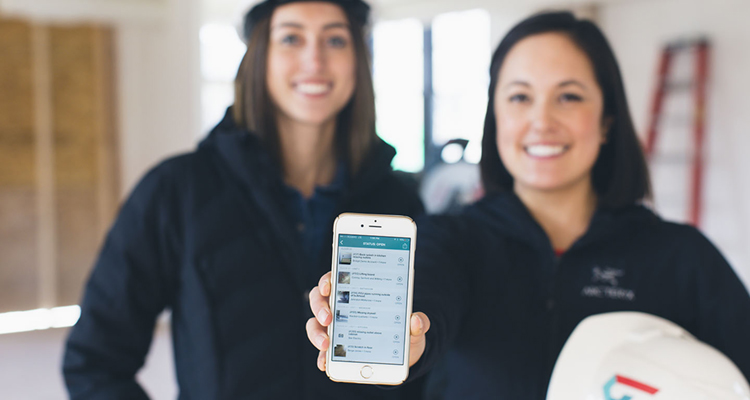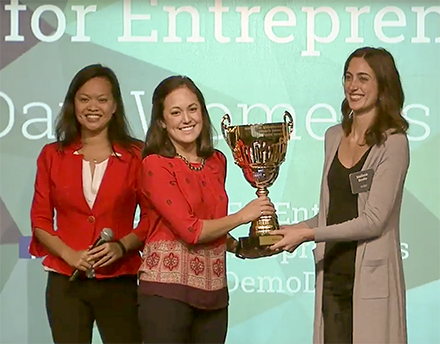
When you show up at someone’s door unannounced, you can’t always be guaranteed a heartfelt welcome. But Mallorie Brodie and Lauren Lake were so sure Communitech would be the home base from which to grow Bridgit, their construction efficiency business, that the tech hub was their first stop when they moved to Waterloo Region in fall of 2013, knowing barely a soul in the community.
“We basically just showed up on their doorstep,” says Brodie, Bridgit’s CEO.
It was one of the better cold calls in the history of Communitech: Since leaving the Hub, Bridgit has boasted 13x revenue growth, landed a clutch of international innovation awards, a CAD$2.2-million seed investment and more than 150 customers across the United States and Canada paying between $1,000 and $3,000 a month for their product (this year, construction giant Lendlease is using Bridgit’s services to manage the renovation of more than 2,400 KFC restaurants across the U.S.).
They’ve also secured a strong reputation as disruptors of the construction business – their technology making a foreman’s job a breeze and revolutionizing the way information is shared in an industry that’s still more clipboards than coding.
Of course, Lake and Brodie were welcomed with open arms at a time when Communitech was helping to cultivate a growing roster of startups. Bridgit was different from other fledgling companies – while many were taking the “build it and they will come” approach, they’d done the market research to validate their product before a line of code was written. The two women filled out a Communitech application, registered their company and were given desk space in the Hub.
“We felt like we were in the lap of luxury,” Brodie says, and they loved showing co-op students around the buzzing space.
But Brodie and her co-founder Lake were also relative lone wolves – both from the University of Western Ontario, Ottawa-born Brodie studied business and Lake, who hails from Stratford, Ont., a graduate of the structural engineering program. Both had grandparents in the construction industry. And both knew that the industry, which had long relied on hard-copy paper trails to track progress on a project, could benefit from technology.

Bridgit co-founders Mallorie Brodie (left) and Lauren Lake are
making inroads in the construction industry with
software to better manage on-site tasks. (Photo courtesy of Bridgit)
From the moment they stepped foot in the Tannery building, Lake and Brodie knew where they wanted to be next: in the Velocity Garage, the largest free tech entrepreneurship incubator in the world, powered by the University of Waterloo.
Thalmic Labs CEO Stephen Lake, a fellow alumnus of Next 36, a startup mentoring program where the pair met and got their first startup capital, spoke glowingly of the Velocity lab to Brodie and Lake (whom he later married). They loved the idea of growing a business in an environment buzzing with entrepreneurial spirit.
“He sold it as a place we couldn’t miss out on,” Lake says.
They breezed through the interview process before encountering one small hitch: the Bridgit founders weren’t University of Waterloo students or graduates, a requirement for entry into the Velocity program at the time (it is now available to all).
“It was not that fun. We were kind of homeless without Velocity,” Lake says. “That program was the way to meet other people and become part of the community.”
“[There was] a whole lot of begging, basically.” – Mallorie Brodie
They tried everything: offered to take part-time classes, even give a 10-per-cent share of their company to a Waterloo student. “[There was] a whole lot of begging, basically,” Brodie says.
After working from Brodie’s basement apartment for the better part of a year, the pair had a stroke of luck befitting the Bridgit brand: Velocity promised them some space in a new area of the Tannery building, but construction delays meant they’d get to work in the actual lab while they waited.
“That was a big win for us,” Brodie says.

Bridgit co-founders Lauren Lake (centre) and Mallorie Brodie (right) took
top prize at a Google for Entrepreneurs Demo Day in California in 2015.
(Photo: YouTube)
Before long, they were immersed in the highly competitive, information-sharing world of their dreams. It lit a fire in the Bridgit bosses. “It’s just that environment where you’re working with 30 other companies in the same room and you’re all sharing information and you’re all at the same stage,” she says. “So if one company had $5,000 of revenue that month, it’s like ‘OK, we should be doing the same things too.’”
They also set about shaping the culture: Once there, Brodie and Lake implemented a sales competition, bringing a little more entrepreneurial verve to an engineering-focused scene. They even brought in a bell – “just one of those silly silver bells you hit if you’re waiting for someone to take your order,” Brodie says – and rang it every time they made a sale. Within a month, bells started popping up on other desks around them, and the “cha-ching” of new revenue rang throughout the space.
After getting some solid financial traction, Brodie and Lake migrated to the Communitech Rev program. The six-month program, designed to help startups scale into full-fledged money-making ventures, appealed to Bridgit: They needed to grow their sales team.
Towards the end of their time at Rev, that little bell started to chime more often. It was soon joined by a gong the pair bought on Amazon, meant to celebrate the larger deals. Struck for the first time in 2015, after one of their sales associates scored a deal with high-rise giant Brookfield Multiplex in downtown Toronto, its reverberations signalled an important moment for Bridgit, Brodie says.
“I think moreso than the actual deal size, it validated that everything we were doing to improve the product was actually working,” she says. That’s huge for a startup – and the Communitech environment made it possible.
“Communitech creates a level of comfort and security to operate within, and I think that’s really important when you’re starting a company . . .” – Mallorie Brodie
“Communitech creates a level of comfort and security to operate within, and I think that’s really important when you’re starting a company and everything feels like it can change at any moment and every day is different,” says Brodie. “You feel like you have this place you can go to and you have other companies going through the same challenges and successes as you, and that relieves a lot of stress.”
Adds Lake, “They’re the village behind your idea.” Its network of experts and its influence in the political space and on the global stage, Lake says, keeps companies like theirs invested in the Waterloo Region tech community.
Last year, Bridgit moved into an office of their own, their company of 30 having outgrown the Tannery. Rather than mourn the loss, Communitech celebrated. “I think they’re really happy and proud to see companies outgrow their space,” Brodie says. All their Communitech friends attended Bridgit’s office warming. And while Bridgit has a growing presence in the U.S. (and has managed to draw top-tier Canadian talent back from Silicon Valley), they’ve stayed in Waterloo Region, in the “startup Mecca” Brodie attributes to Communitech.
“They make everything simple. I think that’s the best thing they can do and it absolutely is what they deliver on.”

